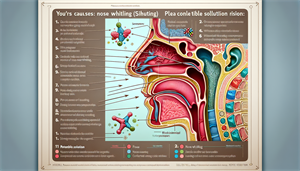
Why Is My Nose Whistling?
If you’re wondering “why is my nose whistling?”, you’re dealing with a common yet often perplexing issue. The simple answer is this: a partial blockage in the nasal passage creates a narrow pathway for air to flow through, resulting in a whistling sound. This can be due to various causes such as allergies, sinus infections, or structural irregularities like a deviated septum. In this article, we’ll dive into the common reasons behind a whistling nose and present actionable strategies to address it.
Nose Whistling Explained
Imagine your nose as a wind instrument. When you breathe, air passes through the tunnels of your nostrils. If these tunnels are clear, you inhale and exhale without any sound. However, if there’s a blockage, the air has to squeeze through the narrow spaces, causing vibrations. And there you have it! Your nose whistles, not dissimilar to a flute. Now, you might wonder, what’s causing these blockages? Well, it’s not always a piece of tissue that you forgot to remove after a sneeze. Sometimes, it’s an indication of an underlying respiratory issue.
Common Causes of Nose Whistling
The most common band members of the nose orchestra are nasal congestion, a deviated septum, and nasal polyps. These conditions can obstruct or narrow your nasal passages, creating that infamous whistling sound. Let’s understand these causes in detail.
Nasal Congestion
Consider your nose as a highway. Now visualize a traffic jam caused by inflammation and mucus buildup, similar to a cold or runny nose. This congestion makes it harder for air to pass through, causing your whistling nose to express its frustration when dealing with a runny nose. Inflammation, the response of your body’s immune system to irritants, swells up the inside of your nose. Add to this, the excess mucus produced as a protective response, and you have the perfect conditions for a nasal concert and a potential sinus infection.
Deviated Septum
Your nasal septum, the wall dividing your nostrils, is like a line drawn with a shaky hand. It’s not always perfectly straight. Sometimes, it’s crooked from birth, or due to an injury. This deviation can create a narrow passage for the air, making your nose whistle while you breathe. In some cases, a perforated septum might also contribute to the nose whistle. Constant whistling through your nose could indicate a hole in the septum, a condition known as septal perforation. This can make the air flow strangely between your nostrils, causing whistling sounds.
Nasal Polyps
Nasal polyps act like unwanted guests lingering at your nasal event. These non-cancerous growths, resembling teardrops or grape clusters, make themselves at home in your nasal passages and sinuses. Unfortunately, these unwanted guests do more than overstay their welcome. They block the nasal passages, forcing air to escape through narrow openings, giving birth to that whistling sound.
How to Stop Nose Whistling: Effective Solutions
Now that we understand the causes, let’s discuss solutions. To silence the nasal orchestra, we have three effective strategies - maintaining nasal hygiene, managing allergies, and considering surgical interventions if necessary. Let’s examine each strategy.
Nasal Hygiene Tips
To maintain nasal hygiene and reduce nose whistling, consider using saline solutions and humidifiers to keep your nasal passages moist and clear. This can help alleviate congestion and reduce the whistling sound. Additionally, practicing good nasal hygiene, such as gently blowing your nose and avoiding irritants, can also help prevent nose whistling.
Managing Allergies
If allergies are contributing to your nose whistling, consider using antihistamines or other allergy medications to manage your symptoms. Identifying and avoiding allergens that trigger your symptoms can also help reduce nasal congestion and prevent nose whistling.
Surgical Interventions
In severe cases where nasal polyps or a deviated septum are causing persistent nose whistling, surgical interventions such as polypectomy or septoplasty may be necessary to correct the underlying issues and alleviate the whistling sound. Consult with a healthcare professional to determine the best course of action for your specific condition.


